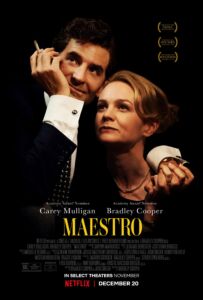Loving Lenny to Death: Maestro
Posted By Trevor Lynch On In North American New Right | 16 CommentsBradley Cooper is a superb actor and director. I loved his A Star Is Born with Lady Gaga. So when I heard that Cooper was starring in and directing Maestro, a biopic about composer-conductor Leonard Bernstein, I had to see it.
Maestro is a masterful work of acting and directing. Bradley Cooper really brings Leonard Bernstein to life. Carey Mulligan is also superb as Bernstein’s wife Felicia. Indeed, there are no weak performances. The sets and costumes are meticulous. The music, mostly by Bernstein himself, is well-chosen, although the bits by Mahler invite unflattering comparisons.
But for all its virtues, Maestro is a curiously empty experience, partly because Leonard Bernstein is not an admirable person, although that would not matter if his life had been better dramatized.
Unlike Todd Field’s Tár [2] or Michael Powell’s The Red Shoes [3], Maestro does not really capture the feel of the world of classical music or the people who are driven to compose and conduct. Instead the movie focuses on Bernstein’s marriage and his infidelities with men.
Bernstein was homosexual. His wife knew it but didn’t care as long as he was discreet. But as America and Bernstein himself became increasingly libertine, his indiscretions became increasingly indiscreet. Felicia left Bernstein in the 1970s. But when she was diagnosed with the cancer that eventually killed her, he dutifully took care of her at the end of his life.
The world of classical music is thus relegated to the background of a rather sordid love story — or several of them, actually. Thus, the effect was uncannily like another virtuosic but sordid and empty biopic about a homosexual performer: Steven Soderbergh’s Behind the Candelabrum (2013), starring Michael Douglas as Liberace.
The early parts of Maestro are a fast-paced, black-and-white quasi-montage. There are rapid dreamlike scene-changes: Bernstein wakes up in his apartment, runs down some stairs, walks through a door, and is in Carnegie Hall. At a rehearsal of On the Town, suddenly Bernstein is one of the dancers. Exposition is stylized. For instance, essential information about Bernstein and Felicia is reeled off by each of them like they are being quizzed.
When Bernstein and Felicia begin their relationship, Cooper relaxes the tempo a bit. Cooper plays Bernstein as manic and charismatic. This explains Felicia’s attraction to him. But it is never clear what his attraction to Felicia is, or why, after four years of some sort of relationship, he proposed marriage.
The truth would have been far more dramatic but far less flattering. Bernstein was not bisexual. He married, at least in part, because he was ambitious. The idea of him changing his name to something less Jewish is mooted, but there were no barriers to Jewish conductors in America in the 1940s and 1950s. There was, however, a very strong barrier to homosexual conductors. Bernstein needed a beard. But before you start thinking that Bernstein was a noble victim of homophobia, you should know that not only did he marry and start a family essentially as props for his career, he also used the stigma he was trying to dodge to gain advantage over a rival conductor and former lover, Dimitri Mitropoulos.
That’s just a tiny taste of Bernstein’s repellent character. But as drama, it would have been far more interesting than what we are given, and it would have connected Bernstein’s marriage integrally to the world of classical music instead of just relegating it to the background. It also would have made his return at the end of her life more touching.
There’s no question that Bradley Cooper loves Leonard Bernstein. He could not have brought this character to life otherwise. Indeed, you could accuse him of loving Lennie to death, treating us to almost the full breadth — although nowhere near the full depth — of Bernstein’s negative traits.
We see his casual promiscuity; his creepily aggressive touching and kissing — including with the tongue — of friends, family, even complete strangers; and his increasingly queeny and flamboyant persona. In one scene, Bernstein, his manager and procurer, and his then-boyfriend Tommy Cothran are snorting coke at a party and talking about “chickens,” which is pedophile slang. At the end of the movie, a bloated and decrepit Bernstein, one foot in the grave, is pawing a skinny, black twenty-something conductor. One wonders how many of these relationships were entirely consensual.
 [4]
[4]You can buy Trevor Lynch’s Classics of Right-Wing Cinema here [5].
When Bernstein’s elder daughter hears rumors about his homosexuality and infidelity, Bernstein sits her down and lies to her. Lenny isn’t guilty of anything; the accusers are just jealous of his superior talent. They are guilty of anti-Bernsteinism.
We are also treated to Bernstein’s dreams and fantasies of patricide, his neurotic attention-seeking (including leaving the bathroom door open when he defecated), his ghastly mugging and grimacing as he conducted, and his addictions, from chain smoking to boozing to cocaine. (We don’t see the opioids and amphetamines.) Bernstein was a physical wreck when he dropped dead of a heart attack, aged 72. Cooper probably shaved a year off his life by smoking his way through practically every scene of Maestro.
Cooper omits any mention of Bernstein’s ultra-Leftist politics, but you can’t accuse him of simply whitewashing Bernstein’s personal life. Why, then, did Cooper omit the darker motives and drama surrounding Bernstein’s marriage? It wasn’t an excess of discretion but a lack of dramatic sense.
What about Bernstein the artist? Doesn’t that redeem this movie? No, not really. I love biographies and biopics about creative people. That’s why I watched this movie. Aside from a small number of people who will watch anything Jewish or anything gay, that’s why almost everyone else watched it.
Maestro, however, turns out to be a movie about the unhappy marriage of a neurotic gay man who happened to be a conductor and his wife who happened to be an actress. As far as this script goes, Bernstein could just as well have been a dentist. Only the soundtrack would have been different.
The younger Bernstein was a talented musical educator, an energetic and committed conductor, and a popular composer of works for the stage such as Candide and West Side Story. As his fame grew and the culture declined, he became more erratic, egomaniacal, and self-indulgent in his music as in his personal life.
I never saw Bernstein conduct live, but I have listened to many of his recordings and watched a number of his videos. Tastes vary, but to my ears only one recording is definitive: his 1959 Shostakovich symphony no. 5 with the New York Philharmonic. I am also fond of his 1980 Prokofieff symphony no. 5 with the Israel Philharmonic and his 1988 Mahler 5th with the Vienna Philharmonic. But nothing else really stands out. Still, if you are looking for repertoire, and the price is right, Bernstein is generally a safe bet.
Bernstein’s works for the concert hall are boring and pretentious (symphonies with titles such as “The Age of Anxiety” and “Kaddish”), but Candide and West Side Story have enduring appeal, if you like that sort of thing. He wanted to be America’s Mahler. He ended up America’s Meyerbeer.
Frankly, though, having watched this movie and read Brenton Sanderson’s overview of Bernstein’s life [6], I would feel dirty listening to any of it.
Maestro was first announced in 2018, the centennial of Bernstein’s birth, when all the major organs of our Jewish-dominated cultural establishment — orchestras, conservatories, music labels, academia, publishing, the press, even Hollywood — pulled together in an attempt to apotheosize Bernstein. Much hot air was expended to inflate his critical reputation to Mahlerian proportions. But the public reception was largely cool.
Maestro is the flaccid anti-climax of the Bernstein centennial. Its production was almost as drawn out as one of Bernstein’s slow movements. Cooper was cast early on to star. Scorsese and then Spielberg considered directing, but for unknown reasons, both dropped out. Maybe they sensed that Operation Apotheosis was flopping. Maybe they took a good look at Lenny and gagged. Thus, Cooper took over direction, and eventually, Netflix took over production. What started as a prestige project ended up on a streaming platform. But through sheer talent, Bradley Cooper has almost redeemed Maestro.
Although I can’t recommend this movie, most of the critics have been kind. There was some hilarious kvetching about Cooper’s makeup being anti-Semitic because he needed a nose-extension to look like Bernstein. (Bernstein’s actual nose, however, was not deemed anti-Semitic.) Award nominations have been generous, but if Maestro wins any prizes, it will be for Cooper and Mulligan, not Lenny. It wouldn’t be the first time that a gilded turd is hailed as great art, but it is a terrible use of Bradley Cooper’s talents.
